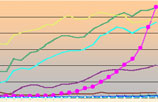Registration of immovables must proceed
(China Daily) Updated: 2015-04-21 08:11
 |
|
The provisional regulations on immovable property registration, which came into effect on March 1, have made little progress in most areas of the country. [Photo/IC] |
The provisional regulations on immovable property registration, which came into effect on March 1, have made little progress in most areas of the country. Nearly 84 percent of cities and 96 percent of prefectures in China are reportedly yet to start the task. Comments:
The establishment of a unified system is the premise for a nationwide system of property registration, to which local support remains the key. Local governments must not complete the tasks in group meetings between leaders instead of making concrete efforts.
Wang Guanghua, an official with the Ministry of Land and Resources, April 19
Of course, local registration of real property is not an easy job and will unavoidably face difficulties in merging and reorganizing a slew of local departments. However, without a unified registration system, the registration is unlikely to give full play to its legislative functions.
Zhang Xunxiang, a researcher with Shanxi Provincial Academy of Social Sciences, April 16
For common citizens and real estate market alike, the establishment of immovables registration will make a lot of differences to them. On the one hand, it is expected to put an end to the isolation between relevant departments, which will in turn work together with higher efficiency. On the other, for citizens, their property rights would be better protected in a bid to make convenient and sound transactions.
Guo Shiliang, a guest commentator with caijing.com.cn, April 16











